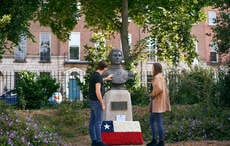Rebekah Knight shares her story in the book ‘The Girl With No…’
A brave Northern Irish woman who was born without reproductive organs wants to spread hope by sharing her story.
25-year-old Rebekah Knight from Co Antrim has shared her story in her book ‘The Girl With No…’ In the book, she tells how her life has been affected by Mayer Rokitansky Kuster Hauser syndrome (MRKH).
Read More: Cork teen undergoes successful life-saving surgery in US after community raises $166k
Speaking with The Belfast Telegraph, Knight recalls that when she still hadn’t gotten her period at the age of 18, she and her mother knew something was wrong. They spoke with doctors who ended up diagnosing her with MRKH, the congenital abnormality marked by the absence of a vagina, cervix, and uterus.
With the diagnosis, Knight learned that she would never be able to carry children of her own.
"It was quite heartbreaking,” recalls Knight. “Every woman wants to be able to carry a child and to be told at 18 that you won't was very hard. However, they [the doctors] explained that I could consider surrogacy or adoption.”
Knight later endured two major reconstructive surgeries in 2013. One of them left her bed-ridden for 12 days and she had to learn to walk again with physiotherapists once she recovered.
Since then, Knight has arrived at a form of acceptance of her condition.
"At the beginning, it didn't seem real but I've learnt to live with it now as I have got older. It broke my mum's heart, though I now know lots of women can't have children for various reasons."
Read More: Miracle as Carlow teen returns from Texas cancer-free
Knight went on to say that her book was born from the idea of wanting “to do something positive."
She added, "The missing word in the title of the book gives the story a little bit of mystery as to what it might be.”
"While it has been traumatic,” Knight says, “I want to show that there is light at the end of the tunnel. At the end of the day, it is not life-threatening and people wouldn't even know you had it because you can't see it.”
"I hope it might even help mothers and fathers whose daughters are going through it, as well as their sisters and brothers, to better understand.




Comments